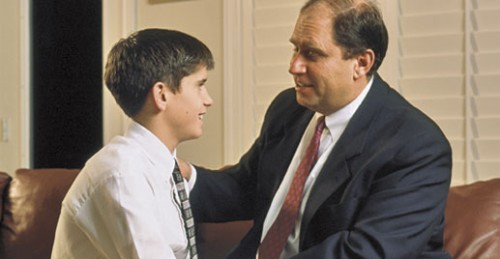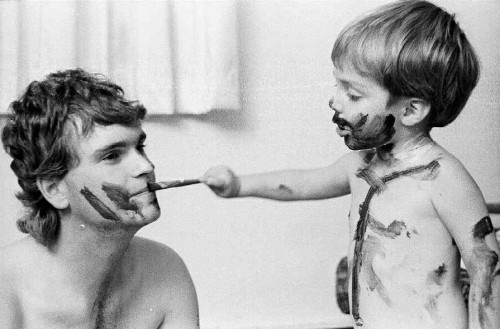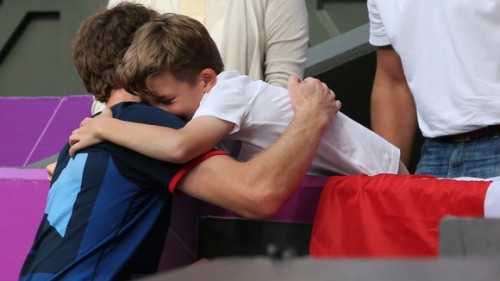Healing Hugs – Sometimes the Best Medicine
I definitely feel that the best gifts in parenting are the small things; for example, "healing hugs."
Some time ago in my medical school training, I was assigned to a hospital emergency room. A child about thirteen was brought in by ambulance one evening after being struck by a car.
He had left a church meeting early with some other boys and had been drinking.
On the way home he walked in front of a car which struck him so hard that it pulled his shoes off and left them on the pavement where he had been standing – and him about ten feet away on the road.
Amazingly, after a physical exam and x-rays, it was found that he had only sustained bruises, abrasions and a fairly large laceration on his scalp.
His parents had been contacted by phone and given verbal permission to treat, but had not yet arrived after several hours of waiting.
I was assigned to suture the laceration and began cleaning and preparing the wound.
Because the child was somewhat inebriated he was quite combative, and it was taking two orderlies and a nurse to restrain him.
Although his wound was anesthetized, it was difficult to reason with him, and he continually moved his heard all around. His head was draped with sterile drapes, and I was using sterile instruments and gloves to suture the wound together.
I had made several attempts to put even one suture in, but he would move and pull it out or make it crooked; and I would have to remove it.
With much persistence I finally got one stitch in and excitedly told him, “We’ve got one done!”
Without thinking, I reached down with my gloved hand and patted him on his chest. As I stroked his cheek with my thumb, I said, “that’s a good boy.”
The nurse gave me a condescendingly angry look as if to say, “you trainee doctors don’t even know how to keep your gloves sterile.”
To everyone’s surprise, however, including mine, the boy immediately lay perfectly still. As I re-gloved and continued suturing, I could see tears streaming down his cheeks.
 The remainder of the stitches were placed in silence without problems; and his mother arrived to take him home, angry that he had been drinking.
The remainder of the stitches were placed in silence without problems; and his mother arrived to take him home, angry that he had been drinking.
Healing Hugs
Very early in the practice of medicine I learned the absolutely amazing power of touch and a kind word.
I have been told numerous times by parents of small children that the best way they have found to control a temper tantrum is to just hold the child snugly and close until it melts into tears or happiness.
Of course a better way to handle it, if possible, would be to try and notice the pressures building so that you can do the hugging before the tantrum takes place.
It can not only help the child, but the parent as well. Occasionally I will see parents in the office who are aware that they are becoming so angry with their child they are afraid they might abuse them.
One such parent, on follow up, told me that the way she had been able to cope during the week was to sit with the child in a rocking chair whenever she felt like she was getting angry.
I have learned that occasionally if I hold a younger child’s older brother or sister on my lap while I examine the younger one, the exam is tolerated much better – many times without tears.
Tender Touch
Early on, I decided that I wouldn’t let many children come and leave my office without a "tender touch" in some way – either a word of encouragement, a hug on my lap, a "tousle" on the head, pat on the back or the like.
Most doctors quickly learn that for self-defense reasons one needs to make friends with every child in the room; even the brother or sister standing over in the corner quietly saying, "I’m not sick, Billy is."
If you can make friends with him when he is not sick, then when you do examine him, he may be less frightened.
 Now you think about it. Does age really make much difference when it comes to healing hugs? A gentle pat on the shoulder of a young mother of three and a statement as I leave the room, "I think you’re doing a great job of raising these kids," can make her whole day.
Now you think about it. Does age really make much difference when it comes to healing hugs? A gentle pat on the shoulder of a young mother of three and a statement as I leave the room, "I think you’re doing a great job of raising these kids," can make her whole day.
I’m sure most parents have noticed that even the smallest touch can facilitate communication
While counseling a young lady of fifteen, I heard over and over again how she really "hated" her mother. The conversation didn’t seem to be progressing no matter how hard I tried until I noticed a small tear forming in the corner of her eye.
Following the silence, I gently wiped it dry with my finger producing a flood more of tears and information about how she felt that she just wasn’t able to please her mother in anything.
Counseling was facilitated and problems began to be solved from then on.
While in the service I saw an eleven-year-old boy for work up of school failure and distractibility.
I had known him since he was nine. He had a normal exam, normal I.Q., normal history, but was failing school.
In the third examination session, I was still puzzled about the cause. I asked him direct questions about every possibility of anger, school, or emotional problems that I could think of.
I had him standing in front of me, but just before I was going to let him go back out into the waiting room, I pulled him down onto my knee with my arm around him and said simple, "this is not like you. I just don’t understand. Please tell me so that I can help you."
It may have been the sudden support that he felt, but unexpectedly he dissolved into great uncontrollable racking sobs lasting for several minutes.
When he was finally able to talk, he described the fear that he had been living with over the past year since he had been involved in some sessions of Satan worship with some older neighborhood children.
It had involved incantations, animal sacrifices, and other things; and he did not know how to get out of it.
Formula For Touch
Someone told me once that they had been given a formula for the amount of touching that a child should have. Sometimes general formulas don’t apply, but I have given it out in my office several times; and I’ll pass it on to you now.
The minimum number of times a child should be kindly touched during the day is related to his age. A one year old – every one hour; a six year old- at least every six hours, etc.
This continues up to age 12 when it levels off to twice a day from then on.
Think about it and see how it fits into your own family. Isn’t the memory of "healing hugs" really one of the best gifts?

